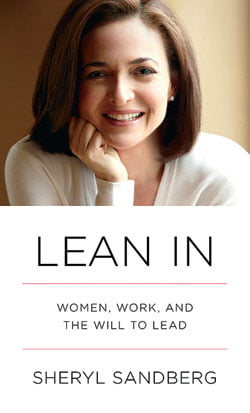In 2011, DC native and Facebook chief operating officer Sheryl
Sandberg delivered a rousing commencement address at Barnard that
challenged the all-female graduates to close the professional leadership
gap between men and women. “So go home tonight and ask yourselves: What
would I do if I weren’t afraid?” she concluded. “And then go do
it.”
Her stirring book, Lean In: Women, Work, and the Will to
Lead, is what Sandberg has done. This electrifying work—which grew
out of a 2010 TED Talk the author gave in Washington—warmly delivers sharp
insight gained from experience at top institutions, including Google, the
US Treasury, the World Bank, and Harvard Business School.
Lean In, the author concedes, is “sort of a feminist
manifesto.” Citing numerous studies, Sandberg describes how and why women
miss out on top positions. She points out, for example, that likability
and success are positively correlated for men but negatively for women and
that inequality at home impedes women in the workplace. “The gender wars
need an immediate and lasting peace,” Sandberg writes. “True equality will
only be achieved when we all fight the stereotypes that hold us
back.”
This book, packed with anecdotes from the author’s life, will
speak to anyone suffering professional woes. Proposing a solution to
nearly every concern she raises, Sandberg emboldens readers of both sexes
to start turning their day job into their dream job: “I would not suggest
that anyone move beyond feeling confident into arrogance or boastfulness.
. . . But feeling confident—or pretending that you feel confident—is
necessary to reach for opportunities.”
Sandberg is often funny and colorful. Paraphrasing an old quote
about Ginger Rogers, she says negotiating can be like “trying to cross a
minefield backward in high heels.” Later, she notes that one downside to
thinking of your career trajectory as a ladder is that “[o]n a ladder,
most climbers are stuck staring at the butt of the person
above.”
She’s a master of the kind of provocative one-liners that earn
nodding, pensive “hmm’s” at public gatherings. One of her best: “We cannot
change what we are unaware of, and once we are aware, we cannot help but
change.”
This article appears in the March 2013 issue of The Washingtonian.

Publisher:
Knopf
Price:
$24.95


















